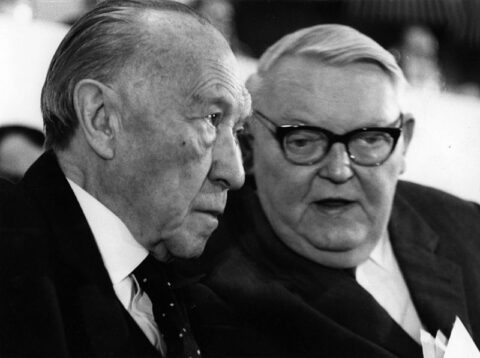The Tank Museum
Published Mar 16, 2024This is the story of the evolution of the tank during World War One. Notorious for its appalling human cost, the First World War was fought using the latest technology – and the tank was invented to overcome the brutally unique conditions of this conflict.
Arriving at the mid-point of the war, they would be built and used by the British Commonwealth, French and German armies – with the US Army using both British and French designs.
00:00 | Intro
01:17 | The Beginnings of WWI
02:13 | The Solution to Trench Warfare
03:47 | Initial Ideas
05:42 | How to Cross a Trench
08:08 | How Effective was the Tank?
15:40 | Battlefield Upgrades
17:09 | New Designs
24:32 | ConclusionThis video features archive footage courtesy of British Pathé.
#tankmuseum #evolution #tank #tanks #ww1 #technology
July 4, 2024
How the First Tanks CONQUERED the Trenches
July 3, 2024
Tanks! – Allied tanks of WW2 – Sabaton History 127
Sabaton History
Published Mar 14, 2024Sabaton has written several songs about tanks — the boys are tank CRAZY! Songs like “Ghost Division” or “Panzerkampf” are about the German panzers and even the Soviet ones, but what about those of the Western Allies? Were they any good? And if so, how did they lose the Battle of France?
(more…)
June 26, 2024
Why the Allies Lost The Battle of France
Real Time History
Published Mar 1, 2024In May 1940, Nazi Germany attacks in the West. The Allied armies of France, Britain, Belgium, and the Netherlands have more men, guns, and tanks than the Germans do – and the French army is considered the best in the world. But in just six weeks, German forces shock the world and smash the Allies. So how did Germany win so convincingly, so fast?
(more…)
June 22, 2024
The Curious Case of Hitler’s Corpse – War Against Humanity 136
World War Two
Published 21 Jun 2024Joseph Stalin claims that Adolf Hitler managed to escape Berlin and is now living somewhere in hiding. It’s complete nonsense of course. But it raises some interesting questions. What remains do we have of Hitler? How do we know they belong to the Fuhrer? And, why is Stalin spreading these far-fetched lies?
(more…)
June 19, 2024
Nazi Werwolves: Post War Terror – War Against Humanity 135
World War Two
Published 18 Jun 2024The guns are silent in Germany but the Allied Forces continue to suffer a flurry of bombings, assassinations, and shootings. Who is to blame? Well, the press suspects the Nazi Werwolves – terroristic bands of men, women, and children determined to carry on Hitler’s war. But just how serious is this violence really, and how many of the attackers are true believing Nazi fanatics?
(more…)
June 15, 2024
June 13, 2024
Debunking the “miraculous” Marshall Plan
If you’ve read anything about the state of Europe in the aftermath of the Second World War, you’ll undoubtedly have heard of the way the Marshall Plan did wonders to get (western) Germany and the other battle-devastated nations back on their feet economically. At FEE, Christian Monson suggest that you’ve been provided with a very rosy scenario that doesn’t actually accord with the facts:

Konrad Adenauer in conversation with Ludwig Erhard.
KAS-ACDP/Peter Bouserath, CC-BY-SA 3.0 DE via Wikimedia Commons.
Unfortunately, the ubiquity of the myth that the Marshall Plan rebuilt Germany is proof that state-controlled education favors propaganda over economic literacy. Despite the fact that most modern historians don’t give the Marshall Plan much credit at all for rebuilding Germany and attribute to it less than 5 percent of Germany’s national income during its implementation, standard history textbooks still place it at the forefront of the discussion about post-war reconstruction.
Consider this section from McDougal Littell’s World History (p. 968), the textbook I was given in high school:
This assistance program, called the Marshall Plan, would provide food, machinery, and other materials to rebuild Western Europe. As Congress debated the $12.5 billion program in 1948, the Communists seized power in Czechoslovakia. Congress immediately voted approval. The plan was a spectacular success.
Of course, the textbook makes no mention of the actual cause of the Wirtschaftwunder: sound economic policy. That’s because, for the state, the Marshall Plan makes great statist mythology.
Not only is it frequently brought up to justify the United States getting involved in foreign conflicts, but it simply gives support for central planning. Just look at the economic miracle the government was able to create with easy credit, they say.
And of course, admitting that the billions of dollars pumped into Germany after WWII accomplished next to nothing, especially when compared to something as simple as sound money, would be tantamount to admitting that the government spends most of its time making itself needed when it isn’t and thereby doing little besides getting in the way.
The Inconvenient Truth of Currency Reform
You are unlikely to find the real cause of the Wirtschaftwunder mentioned in any high school history textbook, but here is what it was. In 1948, the economist and future Chancellor of West Germany Ludwig Erhard was chosen by the occupational Bizonal Economic Council as their Director of Economics. He went on to liberalize the West German economy with a number of good policies, the most important being currency reform.
The currency in Germany immediately after WWII was still the Reichsmark, and both the Nazis and then the occupying Soviet authorities had increased the amount in circulation significantly. As a result, by 1948 the Reichsmark was so worthless that people had turned to using cigarettes and coffee as money.
To give people a true store of value so that they could calculate economic costs accurately, assess risk and invest in the future, Erhard created the Deutsche Mark, West Germany’s new currency. Like ripping off a bandaid, he decreased the money supply by 93 percent overnight.
It’s also worth noting that while Erhard, following his school of Ordoliberalism, did form a central bank, it was at least designed independent from the government and followed a hard-money policy (preserving a stable amount of money) through the length of the Wirtschaftswunder. In fact, the original Bank Deutsche Länder was rather limited in scope until it was reorganized as the considerably more centralized Bundesbank in 1957, incidentally when Germany’s economic miracle began to lose steam.
Other notable liberal policies instituted by Erhard included removing all price controls and lowering taxes from the Nazis’ absurd 85 percent to 18 percent. The American occupational authorities opposed these reforms, but Erhard went through with them anyway. This liberalization had an immediate effect. The black market disappeared almost overnight, and in one year, industrial output almost doubled.
Perhaps most poignantly, unemployment dropped from more than 10 percent to around 1 percent by the end of the 1950s. Normally the government tries to justify currency manipulation as a means to eliminate unemployment, but the Wirtschaftwunder is evidence that sound money does the job far better.
June 11, 2024
EUquake 2024
Although the European elites have managed to move as much as they can out of the reach of democratic institutions, they still have to allow the illusion that the few things ordinary people can vote for still kinda, sorta matter. Ordinary people seem to have noticed this:
“I cannot act as if nothing has happened”, said a weary, dejected Emmanuel Macron, in an unplanned address to his nation last night. The French president, bruised by an unprecedented showing for the right-wing populist National Rally (RN) on Sunday’s European Parliament elections, immediately dissolved the French parliament and announced snap legislative elections. The first round will take place in just three weeks’ time.
When Macron was elected president in 2017, he promised the French people that they will “no longer have a single reason to vote for the extremes”. Pro-EU centrists hailed his apparent defeat of nationalist, populist forces. Seven years later, RN is on course to achieve its best-ever result in an EU election. Marine Le Pen’s party is projected to win double the vote share of the president’s liberal, centrist Renaissance group. Clearly, the French feel that they have more reasons than ever to revolt against the mainstream.
The French are not alone in this. The hard-right Alternative for Germany (AfD), despite two of its leading MEP candidates being dogged by major scandals, came second behind the centre-right CDU. Crucially, it beat all three of the parties in Germany’s governing coalition. The Social Democrats (SPD), led by chancellor Olaf Scholz, suffered its worst result of any nationwide election since the 1940s. According to one pollster, around a million people who supported the left-leaning parties in the “traffic light” coalition have since defected to the AfD. Pressure is now mounting on Scholz to call his own snap election. In Italy, meanwhile, Giorgia Meloni and her Brothers of Italy topped the European polls, exceeding the vote share that swept her into power in 2022’s national elections. Populist, right-wing and hard-right parties, therefore, came in first or second place in all three of the major EU nations.
Even Belgium, at the epicentre of the EU empire, has been struck by the populist earthquake. Prime minister Alexander de Croo announced his resignation last night as his party was beaten to below 10 per cent in Sunday’s federal parliamentary elections and to around five per cent in the European elections – squeezed by Flemish separatist parties. Hard-right parties also came first in Austria and second in the Netherlands.
While Macron has been forced to react to the scale of his defeat, acknowledging euphemistically that these elections were “not a good result for the parties that defend Europe”, others in the Brussels oligarchy have tried to bury their heads in the sand. On Sunday evening, European Commission president Ursula von der Leyen declared – delusionally – that “the centre is holding”.
She is right in one, very narrow, sense. The centre-left Progressive Alliance of Socialists and Democrats (S&D), the centre-right European People’s Party (EPP) and the liberal Renew group have likely gained enough seats between them for business as usual to resume in the European Parliament. The two groupings to their right – the European Conservatives and Reformists (ECR) and Identity and Democracy (ID) – have not made enough gains, even when combined, to start throwing their weight around in Brussels. Von der Leyen’s own position as Commission president is likely secure, not least because her EPP is the single largest grouping in parliament. The new populist MEPs will likely be shut out of key decisions, including the vetting of new EU commissioners. The EU has never allowed the democratic wishes of the public to intrude on its affairs before, so it is unlikely to start now.
But Brussels cannot hide from reality forever. These elections clearly show that the EU and its boosters are failing to contain the public’s anger. European elites have pulled every trick in the book to try to put the brakes on the populist surge, seemingly to little avail.
How bad was the rejection of the kakistocrats in France? This bad:
June 10, 2024
Bigger Isn’t Always Better: A1E1 Independent | Tank Chats Reloaded
The Tank Museum
Published Mar 1, 2024A bigger tank is a better tank, right? Wrong.
Meet the Interwar Vickers A1E1 Independent: a failed prototype, a prototype that proved bigger isn’t always better. Impractical and expensive, it was never accepted into service – but it is said to have inspired equally cumbersome designs including the German Neubaufahrzeug and the Soviet T-35.
Join David Willey, The Tank Museum Curator, as he examines one of the more unusual vehicles in the collection – and discover how it became a focus for political espionage in the early 1930’s.
00:00 | Introduction
02:56 | Tank Design & Vickers
03:28 | Heavy Tank Requirements
05:38 | Initial Blueprints & Prototypes
11:08 | Test-bed Vehicle
14:50 | Myths, Issues and Life after Trials
19:25 | Does it lead to anything?This video features archive footage courtesy of British Pathé.
#tankmuseum #davidwilley #Interwar #heavytanks
June 9, 2024
Operation Downfall: 2 Million Men to Invade Japan – WW2 – Week 302 – June 8, 1945
World War Two
Published 8 Jun 2024The plans to invade the Japanese Home Islands in the fall grow ever more concrete, with the main issue being not just how to transport men by the millions around the world, but where to put them once they get there. On land the fight continues in Okinawa and the Philippines, and at sea the American fleet is savaged by a typhoon for the second time in six months.
Chapters
00:34 Recap
01:22 The Allied Control Commission
02:29 Okinawa
03:50 The War in the Philippines
06:22 Halsey and another typhoon
09:13 Operation Downfall
19:07 Summary
19:24 Conclusion
20:28 Dedication to Donald Wilson Round
(more…)
June 8, 2024
Battlefield Normandy – The battles for Norrey, Bretteville & Putot
The AceDestroyer
Published Jun 27, 2019Hello, welcome to The AceDestroyer and welcome to the third and final episode of the Battlefield Normandy Series. In this episode we follow the Canadians defending Putot-en-Bessin, Bretteville-L’Orgueilleuse and Norrey-en-Bessin. In the two days of heavy combat with the 12th SS Hitlerjugend, the 7th Canadian Infantry brigade managed to hold on to all three towns. Find out how in this episode …
(more…)
June 7, 2024
Redeployment! – Millions of men from Europe to Asia
World War Two
Published 5 Jun 2024Now that Japan is the only Axis power still in the fight, Allied forces — especially American ones — must redeploy to prepare for the final invasion of the Japanese Home Islands. But how do you move millions of men halfway around the globe? And which ones go — veterans, new recruits, or some combination? Who decides? Where exactly do you send them to prepare too, with some many eastern ports like Manila a shambles? Let’s take a look.
(more…)
Battlefield Normandy – The battle of Authie D-DAY + 1
The AceDestroyer
Published Dec 20, 2018June 7, also known as D-Day +1 marked the first battle between the Canadians and the 12th SS Panzer Division Hitlerjugend during the Normandy campaign. When the Canadians attacked Authie, the German 12th SS counterattacked and a large tank on tank battle commenced. The first encounter between the two divisions was immediately a bloody one. The battle unfortunately had a barbaric end as members of the SS murdered several Canadian POW’s in cold blood. Here’s the battle of Authie.
(more…)
June 6, 2024
The reason Germany failed on D-Day (Ft. Jonathan Ferguson)
Imperial War Museums
Published Jun 5, 2024Adolf Hitler was looking forward to D-Day. His plan was simple. Reinforce the western defences, launch a furious counterattack, and “throw the Allies back into the sea”. After that, he could turn his full strength against the Soviet Union and end the war. For Hitler, the outcome of this campaign would be decisive.
In the previous episode of our D-Day series we looked at the air battle for Normandy. This time IWM Curator Adrian Kerrison covers the fighting on land. Why were some beaches bloodier than others? Why did German counterattacks fail? And why did it take so long for the Allies to breakout?
To help us answer some of those questions we’ve brought in the Royal Armouries’ Jonathan Ferguson to look at some of the most important weapons of D-Day.
(more…)
Battlefield Normandy – The Battle of Juno Beach 6 June 1944
The AceDestroyer
Published Nov 18, 2018Hello and welcome to the first episode of my Battlefield Normandy series. This part is all about the landings at Juno beach on June 6 1944, and what happened on the first day of the Allied landings in Normandy. In this episode we will take a look at all the landing beaches and the subsequent fighting. You can find the maps on my Facebook page. The next episode will be about the battle of Authie on June 7, when the Canadians first met the 12th SS Hitlerjugend. I hope you’ll enjoy this video and find it helpful.
(more…)







